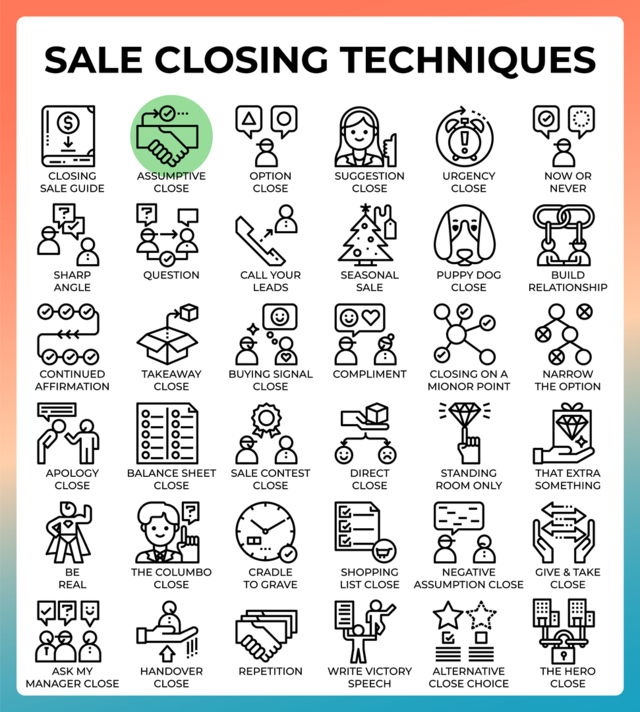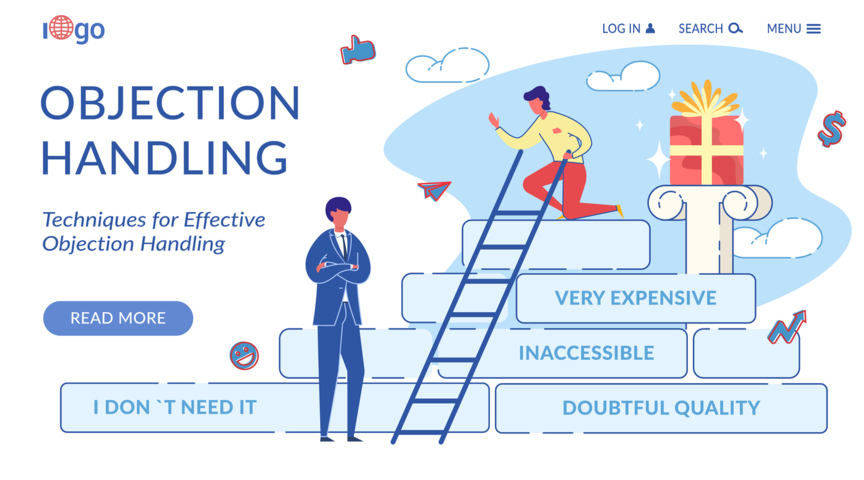As a salesperson, you’ve likely encountered common sales objections from potential customers, but how do you effectively handle them? Knowing how to anticipate and handle customer objections is essential for success in the sales process. Especially since when buyers have fewer objections, your success rate of booking deals will sit at 64%.
In this blog post, we’ll be exploring common sales objections and offering scripts on how to turn these challenges into opportunities. Discovering the best way of handling an objection will help to foster trust and build better relationships with your customers and help you create a better sales team. Whether it’s maintaining price points or emphasizing unique features, if done correctly, mastering rebuttal techniques can move conversations forward while meeting customer expectations. Get ready to explore which tactics work best when tackling topics like budget limitations or lack of interest!
What Are Sales Objections?
Sales objections are concerns or doubts that prospective customers have about purchasing a product or service. These objections can come in many forms, such as price, value, features, or the overall need for the product.
Objections are a natural part of the sales process and are an opportunity to address the customer’s concerns. Sales people can provide potential customers with the information they need to make an informed decision. By understanding the customer’s objections, salespeople can tailor their approach and effectively address any concerns that may arise.
There are several common types of objections, including budgetary constraints, skepticism about the product’s effectiveness, and the need for additional information before making a purchase decision. Salespeople should be prepared to respond to these objections by offering solutions, highlighting benefits, and providing evidence to support their claims.
Ultimately, overcoming objections is key to closing a sale and building a long-term relationship with customers. By addressing the customer’s concerns and providing them with the information they need, salespeople can build trust and demonstrate the value of their product or service.

Objection #1 “We don’t have the budget.”
One of the most common objections salespeople encounter is, “We don’t have the budget.” This statement can be frustrating to hear, but it doesn’t necessarily mean that the prospect isn’t interested in your product or service. It’s important to navigate this objection carefully and provide scripts that help you handle the situation confidently.
One approach is to clarify what the prospect means by “not having the budget.” This gives you an opportunity to showcase the value of your product or service and how it can address the prospect’s pain points.
Another tactic is to offer flexible payment options and discounts for early adoption to make it easier for the prospect to say yes. Remember, objections don’t always mean the end of a sale. With the right mindset and approach, you can turn them into a positive outcome.
Script:
- “I understand that budget is a concern. Can you tell me more about what would make this product work for you within your budget?”
- “I know that having the right budget is important, and I’m sure we can find a way to make this work. Would it help if I found ways to reduce the cost? We could offer payment options such as splitting payments into monthly installments?”
Objection #2 “It’s too expensive.”
When it comes to sales, one of the most common objections you may hear is, “It’s too expensive.” While this can be frustrating to hear, it’s important to remember that this objection doesn’t necessarily mean that the prospect isn’t interested in your product or service.
In fact, this objection may simply be a signal that the prospect needs more information about the value of your offering. To combat this objection, it’s essential to highlight the benefits and ROI of your product or service. One approach you can take is to focus on the long-term savings or revenue generation that your offering can provide. Additionally, you could consider offering a payment plan, a discount, or a free trial to help alleviate any financial concerns.
Script: “I know that having the right budget is important, and I’m sure we can find a way to make this work. Would it help if I found ways to reduce the cost and offered payment options such as splitting payments into monthly installments?” OR “I understand that the cost of our product may seem high. However, I can assure you it’s well worth the investment due to its long-term savings and revenue generation potential.”
By addressing the prospect’s objections in a thoughtful and informative manner, you may be able to turn a hesitant prospect into a happy customer.
Objection #3 “I’m not sure it’s the right fit.”
When pitching a product or service, it’s not uncommon to hear the objection, “I’m not sure it’s the right fit.” But don’t let this discourage you. The key to overcoming this type of objection is to show the potential customer that your product or service is, in fact, the perfect fit for their needs.
Successful sales reps will typically provide detailed information about the features and benefits of your offering. Additionally, you can offer a free trial or demo to help demonstrate why it’s the perfect fit for their needs. The more information you can provide on how your solution will solve their problem, the better chance you have of overcoming this objection.
Script: “I understand that it may not seem like the perfect fit right away. However, I think if you take a closer look at our product or service, you’ll see that it can help address your needs effectively. Would it help if I gave you more information about how this could work for you? Or would you like to take advantage of our free trial or demo to experience it for yourself?”
Objection #4 “I need more time to think.”
When it comes to sales, “I need more time to think” is a common objection that salespeople hear from potential customers. But how can you overcome this objection and still close the sale? First, try to empathize with the customer and understand their hesitation. Then, ask questions to uncover any underlying concerns or objections they may have. From there, you can address their concerns and offer a solution that meets their needs.
Script: “I completely understand that you need more time to think. Can I ask what specific information you’re looking for in order to make a decision?” By addressing their concerns and providing valuable information, you can increase your chances of closing the sale.
Objection #5 “I Have A Contract With A Competitor.”
One common objection that sales teams often encounter is when a potential customer says, “I have a contract with a competitor.” This can be frustrating for salespeople, as it can feel like they’re hitting a dead end. However, there are several reasons why this objection occurs.
Firstly, customers may feel loyalty toward their existing provider and be hesitant to switch. Secondly, they may not want to go through the hassle of canceling their current contract. Finally, they may be locked into a long-term agreement that they cannot break without incurring penalties.
To overcome this objection, sales teams should focus on emphasizing the unique benefits of their product or service. For example, they could highlight how their offering is more cost-effective, has better features, or provides more personalized support. Additionally, salespeople could offer to help the customer through the cancellation process or provide incentives to offset any penalties.
Script: “I understand that you have a contract with a competitor currently, which shows you are committed to the quality of your service. However, our product offers distinct advantages over theirs, such as [unique benefits]. If you want, we can help assist with the cancellation process or offer you incentives to help make the transition smoother.”
Objection #6 “I’m Not Authorized To Make These Types Of Decisions.”
When selling to larger organizations, it’s not uncommon to hear the objection that “I’m not authorized to make these types of decisions.” This type of objection can be frustrating. It often means that salespeople need to start their process over again with a different decision-maker.
To overcome this type of objection, sales teams should focus on building a relationship with the gatekeeper. This should involve an understanding of their role and how they can help move the sale forward. Additionally, salespeople could provide helpful resources that make it easier for the gatekeeper to pass along to the decision-maker.
Script: “I understand that you’re not authorized to make this type of decision. I’d like to work with you to find the best way to get in touch with the appropriate decision-maker. Would you be open to providing me with contact information or other resources that might help me reach out?” By focusing on building a relationship and providing helpful resources, sales teams can increase their chances of eventually closing the sale.
Objection #7 “Your Product Is Too Complicated.”
Another common objection that sales teams encounter is when customers say that a product or service is too complicated. This type of objection can stem from a lack of understanding of the product. However, some customers may simply be overwhelmed by the complexity.
To overcome this type of objection, sales teams should focus on breaking down complex concepts into simpler terms. Additionally, salespeople could offer to provide a demonstration or walk the customer through how they can use the product or service.
Script: “I understand that our product may seem complex at first glance. However, I’m confident that if I demonstrate how easy it is to use, you’ll see why it’s the perfect solution for you. Would you be open to me walking you through how it works?”

Wrapping It Up
In conclusion, customer objections can be a difficult hurdle to jump. However, with the right sales strategy, they don’t have to be. By anticipating common objections such as “We don’t have the budget,” “It’s too expensive,” “I’m not sure it’s the right fit,” or “I need more time to think,” and having appropriate scripts for each of them prepared in advance, you can better prepare yourself for customer objection issues.
Taking the time to develop thoughtful strategies and scripts ultimately equates to greater success when handling customer objections. On top of these strategies and scripts, you can also employ your own sales strategies. Consider tactics like active listening and probing questions. This will not only help you gain insight into customer motivation but will also make them feel heard, which can go a long way on its own.
If you’re looking to hire new sales candidates or looking for the next sales job of your dreams, let Sales Recruiters Chicago help you. Our team of sales headhunters specializes in finding and placing top sales talent.



Comments are closed.